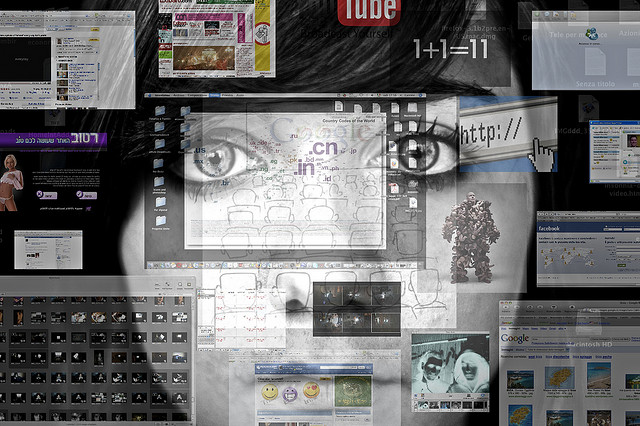
Photo by Federico Morndo
At the turn of the 1970s, sociologists were concerned that with enhanced technology and increased productivity, we will soon have so much leisure time that we would not know what to do with it.
I knew something was seriously wrong when I recently noticed myself taking my mobile phone yet again to the bathroom, so I could respond to some messages while in there. Having successfully kicked the habit, some years ago, to switch-on my blackberry the first thing in the morning and switch-off the last thing at night, I was certainly falling prey to the old instincts.
Sometimes rationalized as being productive, sociologists have a new term for this phenomenon of being ‘switched on’ all the time – Everydaython – the idea that many of us are trying to run a marathon every day. Between emails, Facebook, apps, chats, videos, and games, this online busyness is an addiction – something we are unable to let go of, despite being aware of its harmful effects.
As Nassim Taleb, the author of Fooled By Randomness, put it, ‘The difference between technology and slavery is that slaves are fully aware that they are not free.’
What is behind this addiction?
Several factors contribute to our belief that being perpetually connected is the only way to be in our modern society.
1. Online activity defines our self-identity
Being busy is not only seen as a necessity, but also considered almost a reflection of our importance. It’s as if attending to emails, or posting Facebook updates and waiting for the response, provides a key purpose to our existence. The sight of numerous notifications energizes us; and receiving too few emails overnight is dissatisfying.
As we get more and more invested in being this way, we begin to subliminally let it define our self-identity. We start to associate our self-worth with the number of emails we receive every day, the number of friends on our social network, or the number of likes on our updates.
2. Social reverence for multi-tasking
The other factor leading to this addiction is the social reverence for multi-tasking. In our society in general, and in most of the corporate world in particular, multi-tasking is valued highly and rewarded handsomely. We love to instantly flip between emails, calls, apps, books, and newspaper, preferably managing all of that on one device.
As an example of how far it has gone: in a recent survey, it was determined that 38 million Americans have done online shopping while on their toilet.
3. Restlessness to get somewhere
We are an achievement-oriented society and that goads us towards higher achievement all the time. While it’s a wonderful source of energy for the most part, it also has the potential to make us forever yearning for more. As a result, we are never content with where we are and are constantly restless to get to our next high.
No different from a smoking or a drug addiction, we are unable to wean ourselves off the incessant need to stay plugged-in. We feel incomplete without it. Unless we get our fix every few minutes, through some online device, we feel extremely edgy.
4. Omnipresent accessibility and instant gratification
The fact that Internet connectivity is now nearly omnipresent makes being perpetually switched on eminently viable. It’s very possible to be enjoying a lazy evening when an innocuous query leads you to google and before you know it, you have been surfing the net for hours. Simultaneously, split-second search results and quick-fire responses make being online a platform for instant gratification.
The impact
This manic busyness has wide-ranging negative impact on us. Here are three significant ones.
1. Mental (and physical) health
The constant mental buzz created by being switched on 24/7 leads to increased anxiety and emotional imbalance. Restlessness emanating from the desire to multi-task and maximize our experiences is a significant source of increased stress. Further, a strong identification with the personal impact of every email/ online message generates an emotional whirlwind within us.
Owing to an active and anxious mind that refuses to rest, sleep deprivation is a common outcome. All these consequences have a serious impact on our physical well-being. Increased stress levels, coupled with lack of sleep, negatively influence our immune system, blood pressure, weight-gain, and effective functioning of the brain, including memory and cognition.
2. Dwindling ability to be present in the moment
This heightened busyness and multi-tasking often has exactly the opposite effect to what we are hoping to accomplish through it – rather than improve, both, our effectiveness and productivity suffer. While aiming to maximize through multi-tasking, we end up having fractured attention towards everything we are engaged in.
While attending to emails, we are also checking the cricket score; while reading a book, we are also engaged in a WhatsApp chat. Not being fully present in the moment dilutes our focus and hence our productivity. Neither our emails turn out to be well thought through, nor is our reading the book or playing a game a fulfilling experience.
Unfortunately, the lesser our productivity, the more we throw ourselves into being busier – making the situation only worse. Also, the more we get sucked into this busyness, the more we are unable to pursue other meaningful interests; resulting in further gravitation, with every free moment, towards the online world.
3. Relationships
Our inability to be fully engaged in the moment directly hampers our listening and the quality of connection with people in our life, particularly our family members. Further, being constantly mentally occupied makes us more irritable, as every unexpected demand from the family on our time is a perceived threat to our plans.
Besides, getting addicted to our devices takes us away from our family. Not only do people not have time for their kids, increasingly people in many large cities do not have time to even have kids.
What we can do about it
‘People often expect different results, while doing the same actions.’ – Alcoholics Anonymous
1. Being disciplined about creating clear offline time
It is imperative that we create some clear offline time in our typical day – a non-negotiable window of time when we are not connected to any online device. It could be an hour or two every weekday evening or a stretch of time, say from 9:30 pm to 8:30 am; and a similar stretch of time over weekends, say, Sundays 10 am to 7 pm. You could also plan on certain activities on any day where you commit to necessarily be offline – at dinner, in the gym, or during reading time.
2. Quality down time
Sometimes, creating offline time is not enough as unless you have a concrete activity you are engaged in, it’s tempting to go back to your device. Actively pursuing certain personal interests or family activities often allows us to switch off more completely. Pursuing such activities – sport, reading, playing with the kids – and consciously choosing to switch-off physically and mentally from the online world during that time can be greatly helpful.
3. Practicing mindfulness
Research clearly demonstrates that multi-tasking does not produce effective results, whether for business leaders or teenage students. Practicing mindfulness can help us learn to focus our attention more fully on one thing at a time. This can raise our productivity, work effectiveness, quality of our relationships and emotional well-being.
Mindfulness can also support us in being reflective in better assessing our priorities – and paying greater attention to them. Finally, with this practice, we can be more mindful of the choices we are making from moment to moment – we are then able to exert greater self-control when that urge to get online arises instinctively and are able to set it aside more effectively.











 Meditation II: Power of Visualization
Meditation II: Power of Visualization Suffering and Peace: A Thin Divide
Suffering and Peace: A Thin Divide Spirituality Is No Magic Pill
Spirituality Is No Magic Pill
rajivji youhave pinpointed a weakest pointin moderen way of life which is passed as un-noticed under the shadeof pride tasted in this type of addiction.
Thanks Mela!
Congratulations!and thanks Mr. Rajiv Vij for publishing your book.Very glad about it, though the valuable ideas and writing were all already available on your blog posts. The Book came in handy to gift a couple of youngsters who are smart, intelligent and on the threshold of climbing the corporate ladder. As you have rightly pointed out they are under pressure from parents and peers to ‘succeed’.I hope they get to read your book, identify their core values, pace their lives and be at peace, content and happy always.Best wishes to you. Looking forward to more posts on your blog as well.
Many thanks Vijaya, sounds like you must be one of the first few to read the book:)
Bingo ! Bang on ! At a musical concert this evening the spouse comments how old/frail the eminent music director looks and pronto .. I google his D.O.B. Phew ! For her next comment, the quip came “No smart replies through google please”. In Hindi the Blackberry acronym rhymes with Bibi a.k.a wife. A decade back the boss’ wife commented “Why is the bi-bi not implanted on his fingers” Touché ! As with TV, Internet, Drinking, Drugs, Driving or Diving … the important part of Smart Phone is self-control. Besides the time-off mentioned by Rajiv, it is key to look at people during a conversation .. not talk to your phone with your ears to the group -:) “Get smart .. not phony”
Hey Rajiv awesome blog especially the point on being in the moment and mindfulness we keep seeking future and miss on present . Looking forward to reading the book just ordered on Amazon wanted to check is it available on Kindle ( E book )
Jai Ho
Thanks Sumeet. Look forward to hearing your feedback on the book. No, there’s no kindle version right now…
Very good tips. Also, it busts the popular myth that multi-tasking is a virtue. Instead, I have found that prioritizing tasks, and ‘mindfulness’ or focusing on one task at a time, is a far better method to complete a series of tasks. It’s a pity people don’t realize that they need to get off the treadmill and reflect on what their life has come to be.